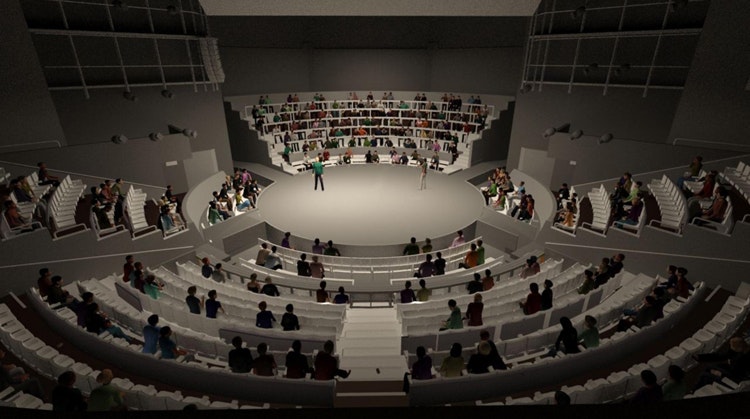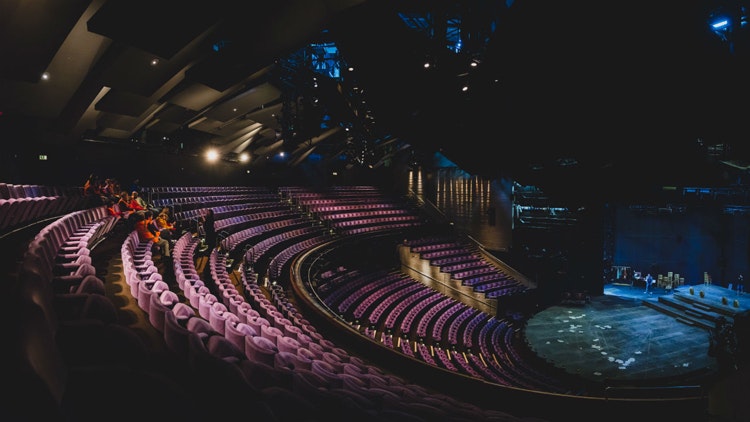London’s National Theatre (NT) has announced that it will be reopening its biggest stage with a redesigned space for the first time since March.
The Olivier theatre has been “transformed” to allow for social-distancing and will be hosting “in-the-round” performances of a new play Death of England: Delroy, written by Clint Dyer and Roy Williams.
The play, which explores the life of a black working-class man, will open to audiences on 21 October with social-distancing measures in place. The theatre was forced to close earlier in the year because of the pandemic.
Tickets can be booked individually or in groups up to four, though all members must be part of a household or social bubble. Face coverings will have to be worn for the whole performance unless people have exempting health conditions.
“Communal experience is crucial for a live piece of theatre”

National Theatre associate and designer Katrina Lindsay tells Design Week that the redesigned space had to feel “welcoming” as well as maintain safety measures.
She says: “The ‘in-the-round’ staging came about after a series of conversations within the NT on how best to open up the theatre to an audience within a socially-distanced world.”
The Olivier is the largest of NT’s three theatres and can usually accommodate 1,150 people in its fan-shaped auditorium. With the new design and 2m social-distancing in place, the capacity will be almost 500.
While the space’s size was an advantage – as it easily allows for social-distancing and good ventilation – there was a worry that it could create an “isolating” experience, she adds.
Simply distancing people in the existing space could have endangered the venue’s atmopshere, Lindsay says. “It could take away from the communal experience that is so crucial for a live piece of theatre,” she adds.
The most significant adaptation is that the seating now wraps around the central stage. This “in-the-round” approach is an attempt to make the experience feel more “communal”.
With the new design, the audience can be safely distanced apart but “feel less isolated as they become part of the event within this communal shape”, Lindsay says.
A focus on cost and sustainability

Theatres have not been in operation throughout lockdown and many venues have revealed bleak financial outlooks because of coronavirus restrictions.
Lindsay says that “low cost” was at the heart of the theatre’s design approach, as well as a focus on sustainability. She says it was “important” that the theatre used “the existing stalls auditorium as much as possible within the shape”.
The new stage has been created by building out over the front two rows of the existing seating, which has “shifted the playing area out into the auditorium”.
This has allowed the theatre to add a seating rostra (a raised seating) onstage which faces outwards to the auditorium. This has been made using an existing steel deck to make it as “economical and sustainable” as possible.
All the materials, including the old auditorium seats as well as the new wood, metals and fabrics will be “hygienically cleaned”. There are “strict routes” that the audience has to enter through and also carefully marked out areas for the actors and backstage crew so that different crowds do not mix.
Potential for “brilliant and creative scenic worlds”
https://www.youtube.com/watch?v=zTm75jseQD0
The new space will hopefully be well-adapted for the second play announced for this season. For the first time, pantomime is coming to the NT in the form of Dick Whittington.
The play was originally commissioned by Hammersmith’s Lyric Theatre and has been adapted for the Olivier’s redesign.
The theatre says it is fitting that Dick Whittington will come to the Olivier in a year where so many theatres across the country have had to postpone their Christmas pantomime productions.
While plans for these two shows have been put into place, the theatre’s website says that tickets are refundable if changing government measures mean that performance schedules are re-arranged.
There is uncertainty about a second potential lockdown in London, while regional lockdowns would mean that people might not be able to travel to the capital for performances.
The stage is however ready for this season and set and productions designers will be working towards the “in the round” brief, Lindsay says. “I am sure designers will find many brilliant and creative ways to create scenic worlds in yet to be imagined ways,” she adds.

- Design disciplines in this article
- Industries in this article
- Brands in this article








